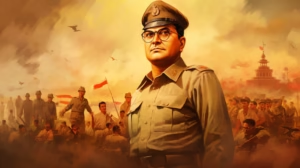Please note that my understanding of our basic needs has evolved and I would write or explain it quite differently to what I have done below. However, the basic principles of this article still holds true and something which has withstood the test of time, I would change, remove or alter some of the elements of this article to better drive home my point. I will do it fairly soon.
Do you have a clear understanding of your fundamental or basic needs? I am not taking of those aimed at survival alone but rather the complete set of needs – physical and emotional. Why do we need to know these basic needs? Well, it is obvious isn’t it? – It is not because you want to prove to yourself that you are not a zombie but rather to better understand the choices we make & actions we take and see if there is a better way to live this life. You may say “Hey, but has not Maslow done this already with his famous theory of hierarchy of needs and there are also slew of new and more accepted theories like Self Determination Theory, ERG theory and so many more. So why reinvent the wheel?”
Well, my answer is simple – as everything in life, what we have sounds great until someone says ‘Surely, This can be better’ and this is my attempt to better our understanding of our own needs. However, I take a slightly different approach to the existing theories (obviously, otherwise what’s point) and tries to analyse the deeper drive behind our needs. I mean, while the existing theories have looked at our behaviours, goals & stated needs and have tried to categorise them, I have tried to go a level down & look at the underlying needs behind these needs. While, I don’t have a formal degree in the field of human motivation & behaviour, I built this theory by looking at life around me with my ‘Analyst’ experience of the IT world. So, I want make it very clear that this theory is my original work developed over a period of over a decade now. In fact, I did submit this two one of the journals but they did not see much value in including this and hence I am going ‘public’ with this theory.
OK, let’s have a look at what have I come up with. So as per my theory – ‘The fundamental needs theory’, we have four basic needs – The Need for Survival, the Need for Progress, the Need for Pleasure & the Need for Validation of Existence. The need for survival is the most important need and but apart from that there is no clear hierarchy between the other 3 needs. However, none of these needs are optional and all of us need to meet these four needs regularly, almost on a daily basis for us to feel good about our lives & lead a happy life. Given this, the four needs can be represented as the Wheel of Needs as below rather than as a pyramid as famously depicted by Maslow. Now, let’s try to understand each of them in more detail.
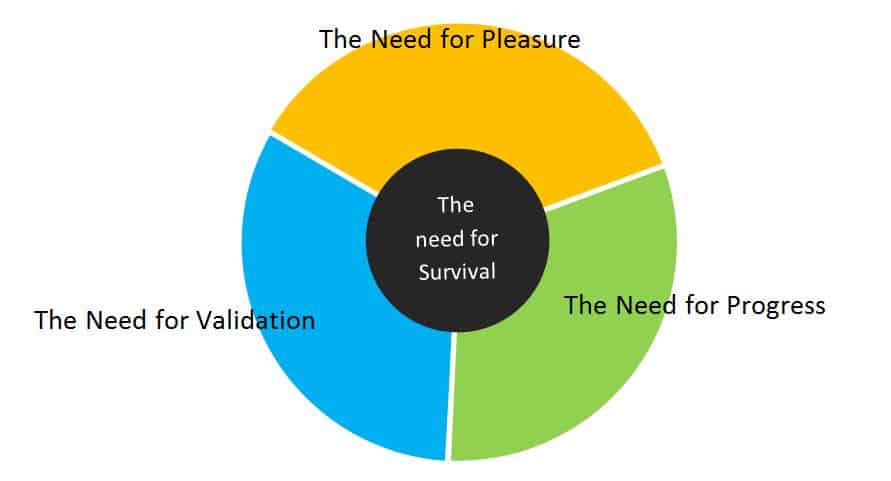
The wheel of Needs
The Need for Survival
The need for survival is the most important & the obvious of all the needs. If this need is not met then every other need takes a back seat and our total focus shifts to meeting this need. In order to satisfy this need, we seek clean air & water, food and ensure that we have it as regularly as we need them. Our need for sleep and rest is not spoken in the same breath as air, water and food but the fact that we spend nearly 1/3 of our lives dozing means that it has to be one of the critical needs for survival. Most of us can skip a meal or two but struggle to skip our sleep.
Even if we have all of the above but if we don’t have good health then it means that our survival is at risk. This forces us to abandon all our quests, even if one of them is to save the world and forces us to save ourselves first by getting back to full fitness. Saving the world has to wait until my fever is gone. Next, we also need a sense of security to feel that we will not be hurt by anyone or anything at all times and if we feel threatened we relocate to a safer place even if it means that some of the above needs get hit. Look at heart-wrenching migration of people from Syria to EU all to get a sense of security. They don’t mind risking their lives to get a sense of security.
Our need for shelter is an essential need but not a must have for survival. It does help us protect ourselves from bad weather conditions and give us an added sense of security. Our need to wear cloths is more a social need which also helps us protect ourselves from adverse weather conditions. Finally, we still have the instinctive urge to mate but given that we have highly evolved brain we have found ways to control or to meet this need by other means. Hence, we don’t have the urgency to meet this need as regularly as some of the others.
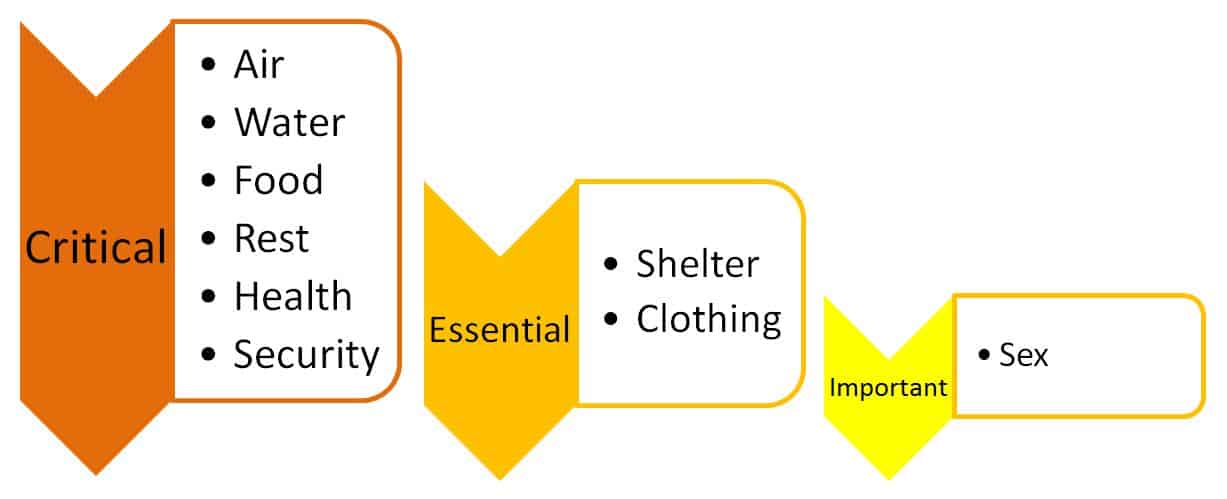
The Need for Progress
The need for Progress is one of the main drivers of our lives and motivates bulk of what we do on a daily basis. This is the need which drives us to aim for a better future for ourselves and set out towards it every day. This need is present in each of us regardless of who we are & our current condition – man or woman, young or old, a beggar or a billionaire & tit drives each of us get up and do what we do. This need however is not limited to us but it is present in every living being on this planet – plants, insects & animals all alike and has been the reason for Evolution on this planet. While majority of other living beings focused to progress in the way they survived and procreated, we humans have evolved beyond that (Obviously, we are 7billion+ now) and have found other activities to meet this need.
This is the need which makes us hope for a better life, dream of bigger goals and make plans & go after that with passion. The size of the goal and the drive we have to achieve it might vary from one another but it is a need we all have it. The very essence of this need is to make us to chase a future state that we desire and work towards getting it. Every activity we engage in whose end state has the word ‘more’ or ‘better’ can be said to be driven by this need. I wanting to make more money or better car or you wanting to help more people or build better solutions are examples of activity driven by this need among others. This need ensures that is never an end to our quests in life. Once we achieve one future state, we aim for and go after another and like it or not, for most of us, this process continues until we die.
So what are all the activities which we undertake to satisfy this need? – Well, there are a lot of activities but we can largely group these into 5 categories:–
- Physical & Psychological growth: Our own growth & growth of plants & animals helpful to us
- Gaining Knowledge: Our curiosity to learn & gain knowledge including formal education
- Acquiring things of Value: Making money & acquiring material wealth
- Making Life Efficient: Inventing & discovering new & efficient ways of doing things
- Improving quality of Life: Improving all aspects of our lives including activities related to other needs better
As the sole focus of this need to make progress, this need makes us measure whatever we possibly can to get a constant feedback of our progress. This is also why we like simple, easy to measure goals so much. Having and achieving the goals are the best & easiest way to track our progress. No wonder we like goals like money made from a deal, calories lost from a workout session or the results achieved in an exam. Being goal oriented is the easiest & the most natural way of being for us.
So, it is obvious that a lack of progress or lack of good enough progress, should I say, makes us agitated and frustrated. Once a goal is set, we just have to reach there at the earliest and if we did not have an equally strong need for validation, we would hardly care about ethics, morality & ill or suffering caused to others. So for this need, the means justify the end. So it is natural for us to get frustration, stress and anxiety if there is an unexpected or unreasonable delay. This is true for all goals – important or not. For example, even when you have nothing significant to do back home (the goal), you tend to get frustrated at every traffic signal where you are made to wait. In fact, we hate all forms of waiting regardless of where it is as waiting is perceived as lack of progress. So, for this need, reaching the end goal matters way more than what you do after.
Finally, this need is the one which makes us constantly compare ourselves with our past or with others just to get a sense of progress. We feel good if the comparison yields favourable results and get upset when it does not. Comparison is essentially a tool we use to measure our progress and while it may not be possible to completely get rid of it, we can certainly find ways to control it.
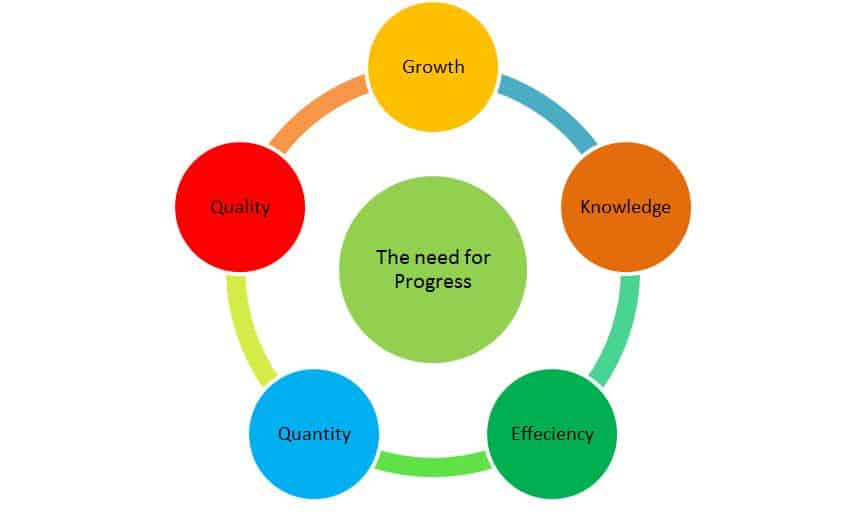
The need for Pleasure
Many learned philosophers have called Time as an illusion as in both Past and the Future is something that exist only in our mind and what we only have is the Present moment to live. They say that the life is a series of present moments but end up looking at it like a long train comprising of our past, present and the future. Some might find it difficult to accept but we have naturally accepted this and have developed a need based on this fact – The need for Pleasure.
This need for pleasure drives us to make the most of it by engaging in activities which help us enjoy the experience of life. We do this in many ways but as a thumb rule we tend to explore activities which give a pleasurable experience to our mind through our senses. So activities like eating tasty food, listening to music, reading books, watching TV, Going to movies, playing/watching games or sports to name a few. These can be grouped or categorised as below.
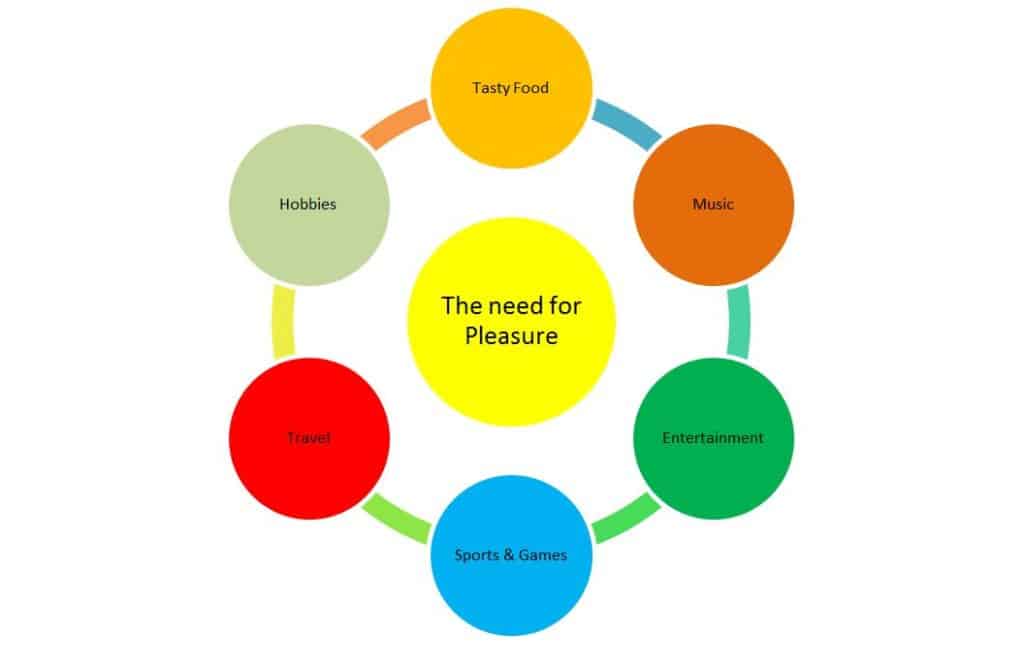
Given the contrasting focus between this and the need for progress means that this gives raise to conflict within us when choosing which activities to engage in. Should I watch TV or do my homework? Should I eat that snack or eat that salad? – These are just two of the conflicting and confusing questions we deal with on a regular basis. What we end up choosing will vary from case to case but typically we side towards progress if the goal is either important or clear and relatively near in future. The activities we do to meet the need for progress are seen important as well like education or work which will also cater to our need for survival. So we try to squeeze in activities meeting our need for pleasure in between activities focused on other needs.
The only exception to this is when some of the activities we engage in end up meeting both the need for progress and pleasure. For example, some of us love to spend a lot of time in learning or reading subjects related to our studies and naturally excel at it. For them this naturally leads to reduced inner conflicts and they can optimise their efforts & amplify what they achieve. This is why there is so much importance about finding a job in the area which we are passionate about.
The need for Validation of Existence
What we have discussed so far are some of the most obvious needs and easy to relate to. What is a bit complicated is to understand our need for others in life. What role do other humans play in our life? Do they meet a specific strong need apart from those listed above? The answer is obviously yes – we are strongly dependent on others to meet our need for love, support and appreciation. While this made sense & could have stopped at that, I wanted to know if there is an underlying need for all of these needs and after a long time, I found this 4th need which is our need to validate our existence.
My brother told me that I am actually complicating by trying to explain that there is a more basic need than our need for love. However, for me it all makes sense and without this need for validation, there will be a big gap in our understanding of human emotions. So, What is this need anyway? Well, let me explain. We are one of the few species who have evolved to have developed self-awareness. This means that each of us understand that we as an individual is separate & different from the world & everyone around us. Once we see ourselves separate from the world, our own lives assume greater importance to us than anything or anyone else. So this self-importance drives us to seek & engage in activities which make us feel important or valued. This feeling of being valued mainly comes from others and hence we try to interact with others. While interactions could have other purposes behind it but it can also include or even solely take place to meet this need to feel valued. A classic example is we share our emotional state of being sad or of happiness with someone to get a complimentary response back from them. A complimentary response of empathy or elation, based on what we share indicates that they care for us & our situation and value us.
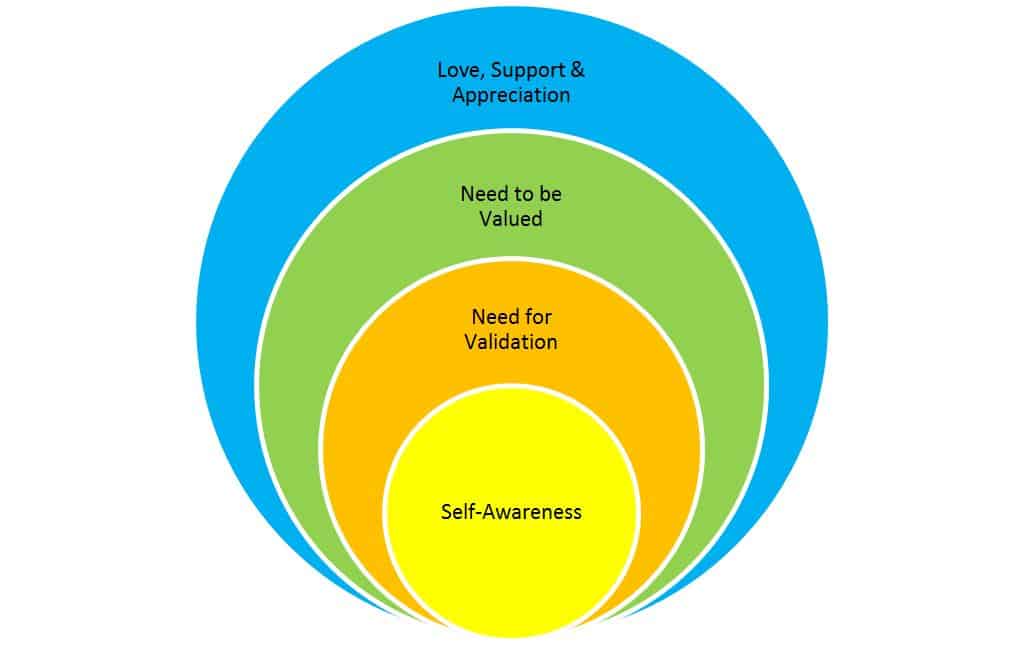
This kind of makes sense but why call it validation of existence? Well, before we can get someone to make us feel valued, they need to recognise that we exist in the first place. So the least & the most basic expectation we have from all our interactions is that the other person at least recognise that we exist. The eye-contact where two individuals look at each other’s eyes at the same time is the simplest activity which validates existence of both parties of the interaction. However, an eye-contact only validates existence but it cannot be termed as positive or negative. In fact, if someone tries to maintain an eye-contact for a more than few seconds without any other expression then it feels creepy and uncomfortable. So we typically follow eye-contact with a smile or a quick ‘Hi’ or ‘Good Morning’ to make that interaction positive. We have a number of such interactions through out the day. Such interactions might not mean a lot to us but the point I am making here is that our need for validation drives those and all our ’emotional’ interactions as you will soon find out.
An eye contact and a smile is the best we can expect from a stranger but that does not make us feel valued enough. As stated before, we, depending on our situation & emotional state want someone to interact with and share our thoughts & end up getting appreciated or comforted. So, when we feel excited, happy, nervous, sad, disappointed and so on, we seek someone to listen to us and respond in a way which is complimentary or supportive to our situation. Generally, our family members like our mom, dad & siblings play this role for us initially and our spouse and kids join-in in the later part of our lives. As we grow & interact with others be it in our schools, colleges or offices, we choose, build and maintain a close circle of friends who also become our listeners and supporters. This is how we end up forming our own family & friends circle.
Regardless of what’s motivation behind the interaction, it must be clear by now that the purpose of almost every interaction we have is aimed at getting a positive complimentary response back. For example, if you ask for a help regarding work in the office, you want the person to help you (aimed at need for progress). If you to want to know more about the latest video game from your friend, you want them to explain it well (the need for pleasure). When you share about how hurt and upset with something, you want the other person to comfort you (need for validation). At the end of each interaction, we review the responses we get from the other person and if it is not up to our expectation then we reduce our interactions with them or if the person is important then we let them know about our disappointment with them. As every one of us has this need, those who spend time in interacting & supporting us will expect an appreciation for their effort and also a similar effort from our side when they are in need. If one of the person involved in the relationship feels that s/he is spending more effort and getting less in return then they will reduce future interactions (know anyone who has ever tried to avoid you?). So essentially, this need for validation ensures that we build a strong family and friends circle to ensure that our need for validation is met to our expectation.
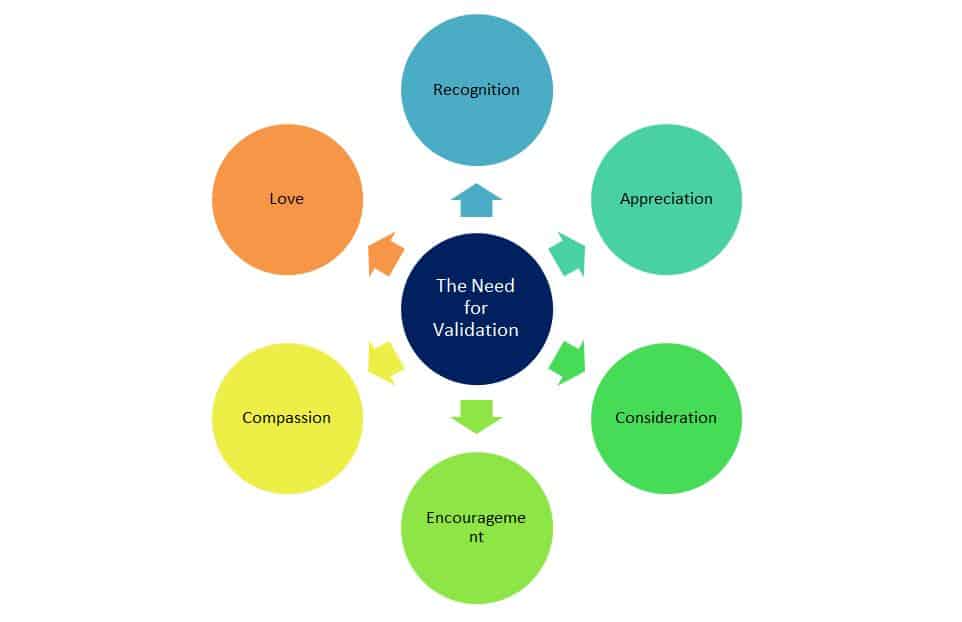
The scale of validation
While our near and dear family and friends meet our basic need for validation, our need for progress does make us aim for more on an ongoing basis. So, we aim to do good things, take on difficult challenges and share useful information with others – all with intent to add value to others & in turn get a feedback from them which make us feel valued. However, all validations happen as a part of interactions and while we only hope for positive response (validation), it cannot be guaranteed. Even the best, flawless YouTube videos have few who have disliked it. Also, interactions can be verbal or non-verbal or both and hence if we plot a graph as below, it makes our expectations & aspirations clear. If we plot a graph of verbal in X-axis and non-verbal in the Y, and then plot the kind of interactions we aspire to then we get the below picture.
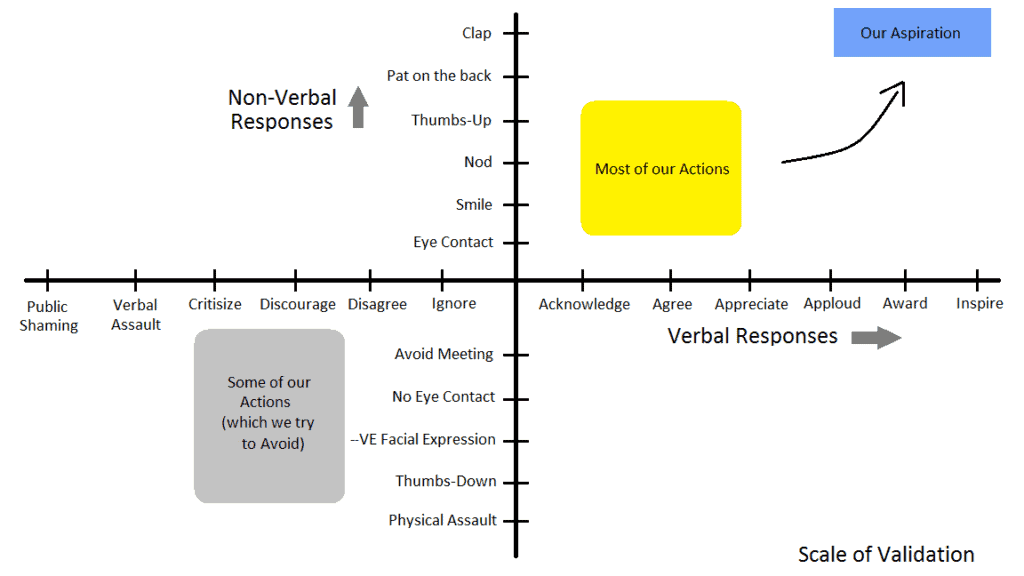
As indicated in the graph, most of what we do results in others acknowledging, agreeing or appreciating our actions. Our actions can be work related or personal, ‘others’ over here could be our family, friends, relatives, colleagues & customers. While the intent behind most our interactions are with a view to get a complimentary response but we do want to engage in interactions where what we do is applauded & awarded and hopefully we are look up for inspiration.
Throughout our lives we do face negative reaction to our actions like discouragement and criticism which we try to avoid as much as possible. If the criticism we hear from others is constructive, supportive and helpful then we try to learn from it so that we can avoid being criticised again. However, even when the criticism is valid but if it gets communicated to us in a way we feel negative then we may even try to avoid interacting with them.
If we take a bird’s eye view of what we do, we engage in only those actions which are considered ‘socially accepted’ primarily because we want to be in the positive quadrant of the scale. We avoid exhibiting or associating ourselves with actions or behaviours which are not well accepted in the society we are part of, even if we love doing it. This is why we care so much about what other’s think of us, our actions and carefully behave based on who is around us.
Need for Validation & its impact on us
Now that we have a good understanding of our need for validation & how we try to meet it, let us look at the impact it has on our identity, our personality, our association & our life’s goals.
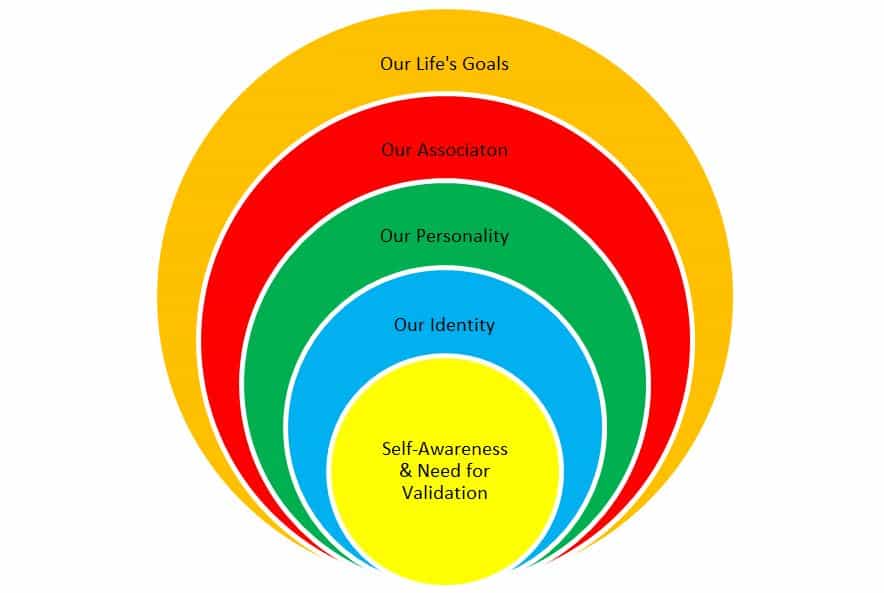
Who we are – Our Identity
We become self-aware as early as the age of two and as we grow we develop a strong sense of identity. This sense of identity is related primarily to our own self i.e. our body & consciousness, the people we relate to – our parents, siblings, etc and things we relate to – our religion, language, nation etc. When we start off in this world, we are like a blank canvas without any idea of these and hence the people around us i.e. our parents, siblings and later on in life our spouse & children matter the most as they strongly contribute to our sense of identity. These people add value just by being part of our life by making us a son/daughter, a brother/sister, a husband/wife & a father/mother. With these additional roles, our life assumes significance and we are no longer someone who is alone in this world. If we discount these people from our lives, we are just another human being who is on our own. Without them, it is difficult to imagine if anyone would have really cared if we are alive or dead. Sure, our parents support us tremendously early in our lives by making available things we need for survival and to thrive in this world. However, the emotional value they and others (siblings, spouse and kids) add is critical as it meets our basic need for validation. So, regardless of what others do, these are the people who would typically care for us all the time. Their huge significance in our lives is not only because they are the minimum bunch who will validate our life at all times but also they contribute heavily in shaping who we are (our identity), who we become (personality) and influencing our life’s goals (what we aspire to achieve). This is exactly why if a relationship with any of these key people goes wrong, it makes life extremely difficult.
However, as all validation happens in our interaction with others, our sense of importance derived from our identity depends on & varies based on the outcome of interactions we have. Each interaction gives us a view of what other’s think of different aspects of us including our identity and this enable us to use this feedback to shape our future interactions to maximise positive validation. For example, if my parents are known to be nice, helpful people in our community then I would want to be seen as their son in every possible opportunity as this aspect of my identity validates my life positively. On the other hand, if they have a bad reputation, I would tend to hide our relationship as much as possible as this validates my life negatively. In essence, we choose to express or suppress our association with any aspect of our identity based on what is validated the most in the society around us. So, based on what we learn from our interactions within the society, we try to identify aspects of our identity which are worth projecting in our future interactions so that we get validated positively. So, our identity gives us a sense of value and importance and validates our existence and hence we try to strongly protect, promote & support everyone and everything contributing to our identity.
What we are – Our Personality
The fundamental aspects of our identity discussed above seldom change. So there could be aspects of our identity which might or might not give us the kind of positive validation we expect. So, we aim to build our personality to maximise positive validation of our lives. Our personality, which is essentially our beliefs & values which get acquired based on the interactions we have with the people and the world around us. So as we grow, we start to develop a unique set of values by interacting with different influential people like our parents, teacher, siblings, friends and now, the internet. This is a lifelong process of trial and error which is based on the outcome of our interactions with the world where we slowly develop our own beliefs and values. More accepted a belief or a value is, the higher the chance for us to make it our own. We do this because this gives us the best chance to get positively validated by others around us or to avoid negative validations. So essentially, we will develop beliefs and values mainly based on how well they satisfy our need for validation. This is why a kid born among terrorists imbibes beliefs and values of a terrorist.
As we have a fundamental need to progress, we are constantly learning from each and every interaction that we have and this process will continue throughout our lives. Our religious beliefs, political views, outlook towards life are all examples of these which gets challenged constantly by the different information we get or interactions we have. As we learn something new about our existing beliefs or values, it prompts us to re-evaluate them regularly. However, as we get older, it becomes harder to face challenges and hence it prompts us to get associated with other individuals or groups with similar beliefs and values so that these get reinforced on a regular basis. However, if we constantly face overwhelming evidence against our beliefs and values then we slowly try to change our personality.
Our personality is the very core of who we are and while the other needs do play a strong part in shaping it, the need for validation is the one which has the biggest effect on it.
What we relate to – Our Association
We follow the same pattern in choosing what & who we want to associate with. As we learn from our environment (i.e. what other people are doing), we choose aspects that we want to be identified with and we set out to achieve that one by one. I, for example, want to be associated with being a vegan, a cyclist, an environmentalist because I have learnt from my interactions that these are good causes to be part of where I get valued or appreciated for exhibiting these associations. Sure, there are other reasons like our health, compassion or the pleasure that we get from those activities and such like which also pay a role in making these choices but if there is a chance that an association will get negatively validated by many, then we tend to avoid such association or keep it private.
One of the other ways we choose to be valued is by associated to something which is bigger than us, like being part of a group as it gives us a sense of importance to us. For example, we form or join social groups representing our interest, language or place of birth as they give us new opportunities for positive interactions but also make us feel being part of something larger than us. As I know that being associated with a good charity gets appreciations, I tend to project the work I did for a charity recently in my interactions with others wherever possible.
What do we want? – Our Life’s Goals
While it is critical to have goals for us to have a sense of progress, the actual goals that we choose to go after also get strongly influenced by our need for validation. First, we choice goals which not only ensure that they strictly lie in the second quadrant of the scale of validation but also help us win appreciation, applauds and awards if possible. However, there are different variations of these and let us look at three examples to get an appreciation of these.
| Goal | Driver 1 | Driver 2 |
| To become an Engineer | This is what my parents want me to become. | The possibility of getting People’s respect in the society. |
| To become part of a start-up | This is what is being highlighted as the best profession to be part of currently in the society | The possibility of being known as a risk taker and as an entrepreneur. |
| To become part of an NGO working with kids | Interacting with kids is what I like to do. | This might inspire others to take up similar work. |
The above are some very specific examples of goals and different reasons which might act as its driver. What you can notice is all the drivers listed above are examples of those which have to do with our interactions with others or other’s perception of us. As discussed already, both of these are to do with satisfying our need for validation. Sure, our need for progress or need for pleasure might impact the goals we end up choosing but as seen above, they are also impacted by the need for validation as strongly as others if not more.
Not only the long term goals but also short or medium term ones like items we want to buy or the experiences that we want to have are influenced by this need as well. So, whatever the goal may be – wanting to buy a BMW car, running a marathon or wanting to travel to Switzerland – all of these get influenced by our view of their value in the world around me and me reaching these goals enhances my own value. This is why once the goal is achieved, we invariably end up sharing the story with the world around us – a select few or to a wider audience so that we get other’s appreciation of our accomplishment and get our life validated. I hope now you know why some of your friends post so many ‘I-was-here’ photos on social media.
So based on the goals we achieve & the reward we get for it, we set our next set of goals. The reward could be the pleasure we get out of it or the progress we make or the validation we get from others or all of it. As we have discussed before, some of our goals are aimed at getting more appreciation & accolades and go up the validation scale. For example, for a sports person, winning a gold medal at a world stage like Olympics is the biggest validation of their life and even though it might not earn much, the drive to be known as a ‘Olympics Gold Medalist’ drives them throughout their lives.
Hierarchy of the Needs & Type of People
Our need for survival is the most important need by far. If there is a threat to our survival (includes being ill) then our other needs take a back seat. If our need for survival is taken care of, then regardless of who we are, we tend to focus on all other three needs but at varying degree. So rather than taking a staged approach as described in Maslow’s hierarchy of needs where we go for higher level needs only after satisfying lower level ones doesn’t hold true. Hence, I represented these needs is as a wheel rather than as a pyramid.
Let’s consider two people to understand how this need evolves or differs – A poor man (Anton) & a rich person (Kevin). They are presented by two different wheels of needs. As Anton earns very little & spends a lot of time working, his significant time goes on to ensure his survival but he will continue to have the other three needs as well. Every day, Anton hopes and expects his situation to get better & might try hard to achieve it. His need for validation will be met by his family or by those around him at his work or around where he lives with whom he tries to build strong relationships. Finally, as and when there is an opportunity to make his present better, he will find ways to engage in pleasurable activities like eating good food, watching entertainment or playing low cost games within his constraints.
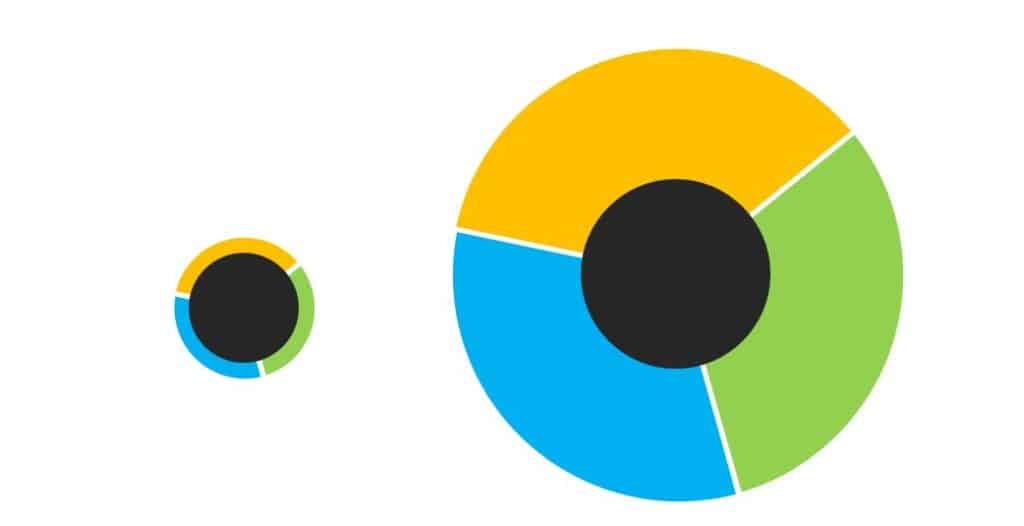
The Wheel of Needs – Poor Vs Rich
In contrast, the Kevin has a bigger wheel of need where each section is bigger as compared to that of Anton. His need for survival is much bigger because of his higher quality of life which demands better quality of food, water, shelter, etc. to meet his basic necessities. His need for progress makes him aim higher than Anton whereas he wants to buy more stuff and accumulate wealth. His need for validation gets met by his family, friends and may be engage in charitable work. His need for pleasure includes experiencing different type of tasty foods, travelling to different places and exploring new enjoyable experiences. So between Anton and Kevin, the four needs have not changed at all. The change is in the size of the wheel of needs which has grown bigger for Kevin as his quality of life is much better. So, each of us has a similar wheel of Needs of our own which is proportional to our current situation and it expands as our situation gets better with time.
Final Words
While we do have distinctly different needs, the actions we engage in can cater to more than one need at a time. I being a fan of a specific sports team not only cater to my need for pleasure when I watch their games but also being associated with them as a strong fan caters to my need for validation. Same goes for the kind of material wealth we choose to process because being wealthy meets our need for progress but being seen & known as wealthy also validates our existence positively. In summary, all of us are driven by all the four needs and for a happier life we should continue to meet all of them on an on going basis. However, based on how we and our priorities evolve, the activities we engage in results in not meeting one or more of the four needs sufficiently. We will look at our actions and the impact it has on our needs in greater detail in another article.
I believe that these four needs clearly explain the motivation behind every action of all human beings regardless of our age, gender or financial situation. I also believe that as this comprehensive theory explains our actions based on the most fundamental of all our needs & hence it gives a better insight into our motivators. This theory also can also explain the reasons for our actions like why do we compare or compete, why we feel dissatisfied with our jobs or with accumulation of wealth and so much more which are difficult to explain using almost all of existing theories. Also, I think, this is the only theory which helps us build our goals so that we can lead a happy, fulfilling life by clearly explaining the reasoning behind it.

